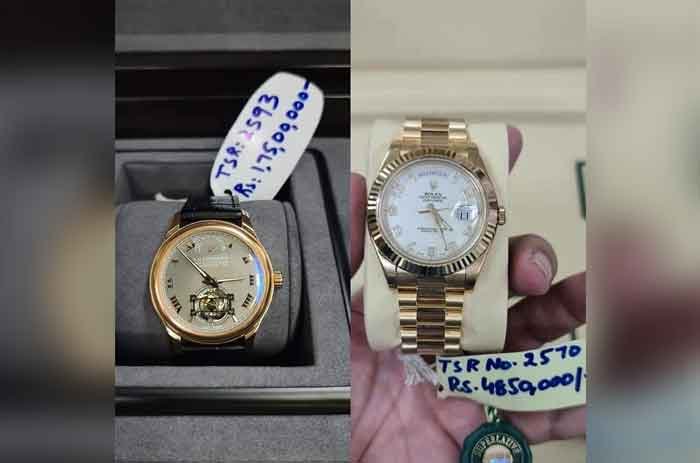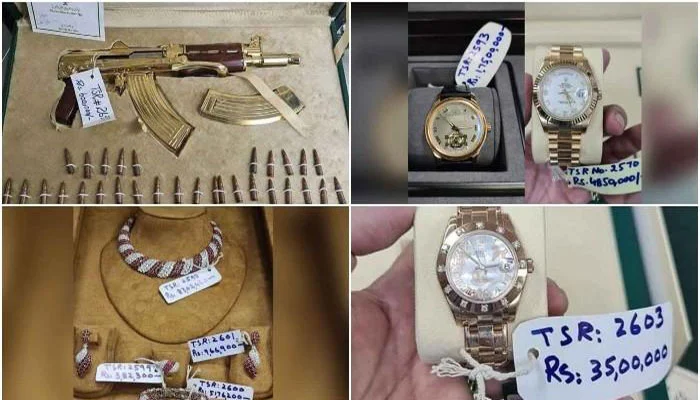ISLAMABAD: Today, the Islamabad High Court (IHC) reserved its verdict on a series of petitions filed by PTI Chairman Imran Khan regarding the Toshakhana trial.
The pleas in question included the ex-premier’s application against the maintainability of a complaint seeking criminal proceedings against him for the charge of hiding Toshakhana gifts.
Another petition sought the transfer of the said case to another trial court. The third petition, filed earlier today, sought the right to defense in the case.

Imran had filed these applications in the IHC. The trial court last month declared the Election Commission of Pakistan’s (ECP) reference against him as maintainable.
The charges were framed against the PTI chief on May 10. IHC Chief Justice Aamer Farooq intervened and put the proceeding on hold. He recently instructed ADSJ Humayun Dilawar to re-evaluate the matter within seven days. The judge outlined eight legal questions to determine the maintainability of the Toshakhana reference.
The questions raised included whether a duly authorized person filed the complaint on behalf of the ECP, whether the ECP’s decision of Oct 21, 2022, served as valid authorization for any officer of the ECP to file the complaint, whether the issue of authorization was a matter of fact and evidence that could be ratified later during the proceedings.
However, during three consecutive hearings, Imran’s counsel Khawaja Haris did not appear before the court to argue the case.
On July 9, ADSJ Dilawar ruled that the reference was maintainable and revived the stalled proceedings, summoning witnesses for testimony.
Yesterday, Judge Dilawar ruled that Imran had failed to prove the relevance of his witnesses in court. He asked the defense counsel to conclude the arguments. He warned that the court would reserve an order on the complaint otherwise.
Today, Justice Farooq heard arguments on the petitions by Imran’s lawyers Khawaja Haris and Gohar Khan. He also heard ECP counsel Amjad Pervaiz’s stance.
The IHC CJ then reserved the verdict on the petitions, stating that the judgment would be announced tomorrow (Friday).
The hearing of PTI Chief’s Toshakhana case
During today’s hearing, Imran’s counsel Haris informed the court that his client had recorded his statement in the trial court. He requested more time to present witnesses. He urged the IHC to suspend trial court proceedings until a decision on the current petition. The lawyer criticized the “haste” in which the case was being heard, stating that it showed “prejudice” in the judiciary.
The IHC CJ asked, “Are you saying that a judge who is hearing the case on a daily basis is biased?”
Haris responded by expressing his desire to present arguments in court. He requested the IHC to suspend trial court proceedings. He asked for this suspension until a decision is made on the petitions before the high court.
Haris emphasized that his client seeks justice from the IHC and considers the Toshakhana case a constitutional matter. The counsel also criticized Judge Dilawar’s remarks about PTI lawyers, deeming them “strange.”
“Are you saying that a different judge should hear your petitions again and take a decision on them?” Justice Farooq asked.
The IHC CJ expressed his concern about the delivery of arguments in political cases being covered by the media. He mentioned that the media covered these arguments “both in the evening and morning.”
PTI counsel Haris argued that the ECP’s complaint against Imran was not filed in a legally correct manner.
He contended that it should have first gone to the magistrate before being sent directly to the sessions court. He further stated that arguments delivered in the evening had a greater impact on people and formed public opinion.
“What does the magistrate do initially? What is the logic in this?” the IHC CJ asked. The lawyer replied that a magistrate had to scrutinize the documents.
During the hearing, the ECP counsel brought up the PTI’s allegations against Judge Dilawar. These allegations were based on three Facebook posts.
However, the counsel stated that the Federal Investigation Agency (FIA) had submitted a report stating that the contentious Facebook posts were not published from the trial court judge’s account.
He asked, “Should contempt of court proceedings not be initiated [against the PTI chief] on the basis of FIA report?”
“Should a criminal case not be filed against Imran Khan? Should justice not be dispensed to the judge? Why didn’t they conduct a forensic analysis of the Facebook posts before levelling these allegations?” he further asked.
During the break in the proceedings, the court announced that they would resume at 3 pm. Justice Farooq also instructed the lawyers to inform the trial court about the ongoing discussion in the high court.
When the IHC hearing resumed around 4 pm, PTI counsel Haris continued his arguments and mentioned that the trial court had previously rejected his client’s list of witnesses, dismissing them as “irrelevant.”
“The first three witnesses were tax consultants, but the last witness was PTI’s central information secretary,” he said, insisting that these witnesses were indeed relevant to the case.
Afterward, the court decided to keep its verdict pending on all the petitions submitted by Imran.


